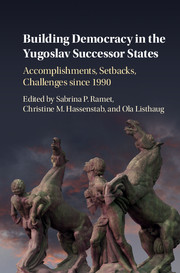 Building Democracy in the Yugoslav Successor States
Building Democracy in the Yugoslav Successor States Book contents
- Frontmatter
- Dedication
- Contents
- List of Boxes
- List of Figures
- List of Tables
- Notes on Editors
- Notes on Contributors
- Preface
- Part I Introduction and Theory
- Part II Country Studies
- 7 Building Democracy in Serbia: One Step Forward, Three Steps Back
- 8 Building Democracy in Croatia since 1990
- 9 A Durable Oligarchy: Bosnia and Herzegovina's False Post-War Democratic Transition
- 10 Liberal Democracy in Slovenia: From Seventh Heaven to the Lobby of Hell in Only Two Decades?
- 11 Macedonia's Post-Yugoslav Reality: Corruption, Wiretapping, and Stolen Elections
- 12 Building Democracy in the Western Balkans: The Case of Kosovo
- 13 The Trajectory and Parameters of Democratic Transition in Montenegro
- 14 Building Democracy in Vojvodina
- Part III Conclusion
- Further Reading
- Index
10 - Liberal Democracy in Slovenia: From Seventh Heaven to the Lobby of Hell in Only Two Decades?
from Part II - Country Studies
Published online by Cambridge University Press: 25 May 2017
- Frontmatter
- Dedication
- Contents
- List of Boxes
- List of Figures
- List of Tables
- Notes on Editors
- Notes on Contributors
- Preface
- Part I Introduction and Theory
- Part II Country Studies
- 7 Building Democracy in Serbia: One Step Forward, Three Steps Back
- 8 Building Democracy in Croatia since 1990
- 9 A Durable Oligarchy: Bosnia and Herzegovina's False Post-War Democratic Transition
- 10 Liberal Democracy in Slovenia: From Seventh Heaven to the Lobby of Hell in Only Two Decades?
- 11 Macedonia's Post-Yugoslav Reality: Corruption, Wiretapping, and Stolen Elections
- 12 Building Democracy in the Western Balkans: The Case of Kosovo
- 13 The Trajectory and Parameters of Democratic Transition in Montenegro
- 14 Building Democracy in Vojvodina
- Part III Conclusion
- Further Reading
- Index
Summary
For the last twenty-five years, some of the most prominent international organizations (Freedom House, Transparency International, the World Bank, the Organization for Economic Co-Operation and Development (OECD), Amnesty International, and the Human Development Report) have repeatedly characterized Slovenia as a champion among Yugoslav successor states for its development of liberal democracy. Nevertheless, aspects in many areas of Slovene democratic and economic life have changed or worsened in the last several years, while signs of stagnation have also been recorded in other areas. It therefore appears to be an appropriate time to assess Slovenia's progress in developing a liberal democratic system, focusing in particular on characteristics of the party arena, the costs of transformation of its economic system, problems of corruption, and the young republic's record in establishing independent media and in protecting ethnic, religious, and sexual minorities.
Political Transformation
At the end of May 1988, at a time when Slovenia was still part of the Socialist Federated Republic of Yugoslavia (SFRY), the Military Council of the Ljubljana District of the Yugoslav National Army (JNA) had three Slovenian journalists and one army sergeant arrested and put on trial. The charge brought against them was that they had published secret documents showing that the JNA had been preparing to arrest a number of liberals in Slovenia and put an end to efforts to democratize the republic. The army magnified the offense to Slovenian public opinion by conducting the trial in Serbo-Croatian, even though it was being held in Ljubljana, Slovenia's capital. The trial galvanized Slovenes, with crowds of 10,000 to 12,000 gathering in protest in downtown Ljubljana day after day for the duration of the trial. In this context, an extralegal Committee for the Protection of Human Rights emerged; the Slovenian communist authorities made contact with this committee and declared their full agreement with the views and aims of the committee. On 27 July 1988, the four accused – among whom was the future defense minister and eventual prime minister, Janez Janša – were found guilty and sentenced to prison terms ranging from five months to four years. An opinion poll conducted at the time revealed that 63 per cent of Slovenes wanted to see their republic secede from the SFRY.
- Type
- Chapter
- Information
- Building Democracy in the Yugoslav Successor StatesAccomplishments, Setbacks, and Challenges since 1990, pp. 256 - 286Publisher: Cambridge University PressPrint publication year: 2017
- 4
- Cited by


